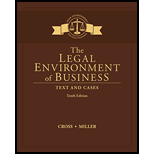
Case summary: Person LC is working as a professor at the University of Massachusetts’s department of plant, soil, and insect sciences. The professor applied in the Drug Enforcement Administration (DEA) for permission to register for the production of marijuana for clinical research. He stated that the Food and Drug Administration (FDA) approved the usage of marijuana in medical and adequate quality supply. However, an administrative law judge suggested that the application can be granted but the DEA rejected the application. DEA stated that the professor has to prove that effective control for unapproved purposes of marijuana will be taken and that the competition to supply it is inadequate. The administration noticed that the professor did not prove the above concerns. The professor appealed to the U.S. Court to review the order.
To find: The standard on which the court will defer to the agency’s interpretation and application of such standard.
Want to see the full answer?
Check out a sample textbook solution
Chapter 23 Solutions
The Legal Environment of Business: Text and Cases (MindTap Course List)
- 1) At the end of all her written communications, employee writes "have a blessed day." One of employer's most important clients requests that employee not do so and employer asks employee to stop. Employee refuses, saying it is a part of her religion. If employee sues the employer for religious discrimination, is she likely to win? 2) A Michigan Holiday Inn fired a pregnant employee because the "very Christian" staff members were very upset by her talk of having an abortion. Has the employer violated Title VII? 3) A police officer who is assigned to a casino refuses the assignment, claiming his Baptist religion prohibits him from gambling or being around gambling. Is he legitimately able to do so? Respond to the questions list in each with support / justificaiton from fact / law / regulation. Cite as appropriate. A paragraph for each (1pg-ish) should do the trick.arrow_forwardIf the Rochester Corporation experienced unresolved legal problems with one of its customers located in a foreign country, all of the following except which one would be a potential way to remedy the problem?\ a. Engage in arbitration b. Have the court system use dispute settlement law to reach a resolution to the problem c. Use the services of a mediator or an arbitrator d. Bring about litigation in the reigning court of law Obtain an executive order from the U.S. Attorney General’s officearrow_forwardWhich of the following presides over formal agency adjudications at the federal level?An administrative law judgeA federal magistrateA federal district judgeA judicial commissionearrow_forward
 BUSN 11 Introduction to Business Student EditionBusinessISBN:9781337407137Author:KellyPublisher:Cengage Learning
BUSN 11 Introduction to Business Student EditionBusinessISBN:9781337407137Author:KellyPublisher:Cengage Learning Essentials of Business Communication (MindTap Cou...BusinessISBN:9781337386494Author:Mary Ellen Guffey, Dana LoewyPublisher:Cengage Learning
Essentials of Business Communication (MindTap Cou...BusinessISBN:9781337386494Author:Mary Ellen Guffey, Dana LoewyPublisher:Cengage Learning Accounting Information Systems (14th Edition)BusinessISBN:9780134474021Author:Marshall B. Romney, Paul J. SteinbartPublisher:PEARSON
Accounting Information Systems (14th Edition)BusinessISBN:9780134474021Author:Marshall B. Romney, Paul J. SteinbartPublisher:PEARSON
 International Business: Competing in the Global M...BusinessISBN:9781259929441Author:Charles W. L. Hill Dr, G. Tomas M. HultPublisher:McGraw-Hill Education
International Business: Competing in the Global M...BusinessISBN:9781259929441Author:Charles W. L. Hill Dr, G. Tomas M. HultPublisher:McGraw-Hill Education





